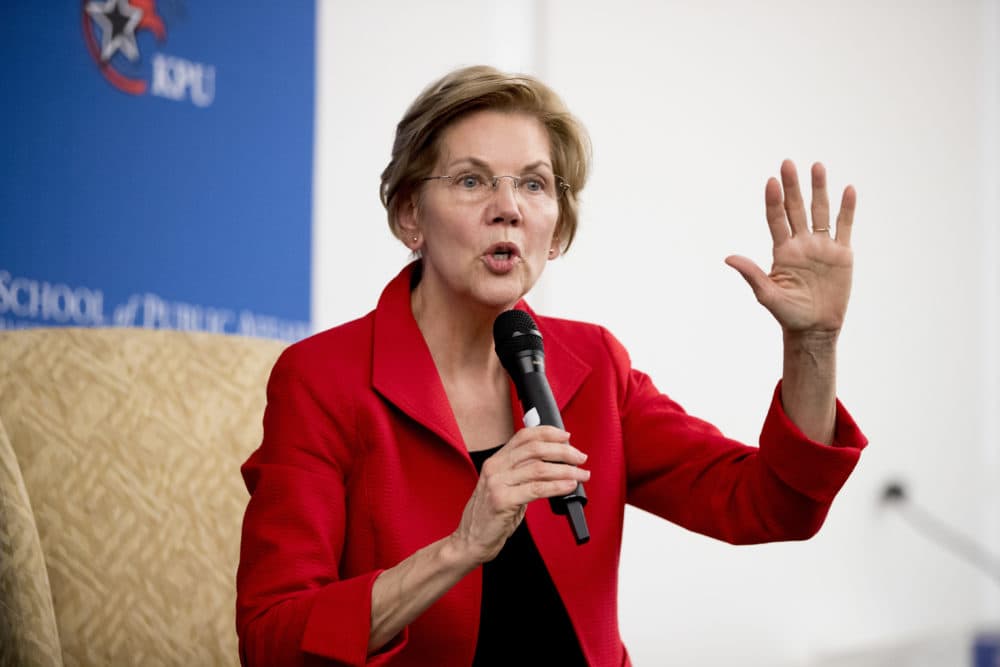Advertisement
Commentary
The Latest Sign Elizabeth Warren Is Running For President? Her Foreign Policy

Now that former Massachusetts Gov. Deval Patrick has decided to bow out of the presidential sweepstakes, we are awaiting yes-or-no declarations from two other Bay State politicians rumored to be running. John Kerry, whose musings by his own account don’t include visits to key nominating states, appears less serious than Elizabeth Warren, who has convinced politics-watchers that she’s running. (I’m leaving out some Massachusetts congressmen who’ve been mentioned as possible candidates, partly for the odds: No one has made it directly from the U.S. House to the White House since 1880.)
One sign that Warren is serious is that she has mapped out a foreign policy, in a recent speech at American University and in an essay in Foreign Affairs magazine. The Republican National Committee, channeling the Republican president’s obsession with race, attacked her on “the two topics she knows the least about: her heritage and foreign policy.”
Actually, and to no one’s surprise, Warren's foreign policy is more sensible than Donald Trump's. What might startle people on the right and left is that she favors a more robust U.S. global role than her progressivism could lead them to believe.
... she favors a more robust U.S. global role than her progressivism could lead them to believe.
Unlike potential rival Bernie Sanders, who after demonstrating little foreign affairs awareness in 2016 is boning up on the topic, Warren talks about the world-bettering potential of American leadership and the need to contain Russia and China (diplomatically) as they seek “spheres of influence.” Sanders’s crash course on “how the world works” apparently isn’t taking; he doesn’t mention those dynamics, even though it’s clear to any news follower that those two increasingly authoritarian nations don’t mean us well.
The differing world views of Warren and Sanders led one commentator, CUNY professor Peter Beinart, to dub her the Harry Truman to his Henry Wallace. (That’s a good thing for Warren, as Wallace, who ran against Truman in 1948, was myopic about the Soviet Union’s malice.)
The loony left talks about fighting poverty while slamming globalization; Warren accurately notes that global trade “has opened up opportunity and lifted billions out of poverty around the world.” Yet future trade deals, she says, must target tax havens, “multinational monopolies,” and inequality-promoting labor standards, while swapping access to American markets for other nations’ embrace of higher environmental standards to combat climate change.
Those are breaks with Trump, and Warren’s differences on war and peace are no less stark. Candidate Trump campaigned on scaling back our self-destructive war in Afghanistan, then let himself be browbeaten into upping our commitment. Warren respects our military; all three of her brothers served, she writes. But she adds that “having a strong military doesn’t mean we need to constantly use it,” wisdom that general-turned-president Dwight Eisenhower practiced.
Advertisement
Warren accurately notes that global trade “has opened up opportunity and lifted billions out of poverty around the world.”
“The human cost of [Afghanistan and Iraq] has been staggering: more than 6,900 killed … another 52,000 wounded, and many more who live every day with the invisible scars of war,” she writes in Foreign Affairs. “By financing these conflicts while cutting taxes, the country has essentially charged the costs of war to a collective credit card for future generations to pay, diverting money that could have been invested in critical domestic priorities.”
And at a time when horrifying photos of Yemeni children, deliberately starved by the U.S.-supported Saudi war, show the moral bankruptcy of that support, Warren warns that our policies also “risk generating even more extremism.”
None of this military involvement, directly or by proxy, makes Americans safer, she says. Warren would repatriate our troops from Afghanistan and Iraq; audit the Pentagon to craft a “sustainable” defense budget (a member of the Senate Armed Services Committee, she says our $700 billion outlay is more in real terms than President Reagan spent during the Cold War); and reallocate some defense savings to diplomacy, foreign aid (now less than 1 percent of the budget, contrary to popular misperception) and domestic needs.
None of this thoughtfulness will erase the fact that she's a demon to the right. And even on the left, discomfort simmers over whether she should have released her DNA test to prove fractional Native American ancestry. The Boston Globe editorial board fears that, because of these controversies, she has “missed her moment” to seek the White House.
Democratic voters will make that call, should she run. The point for now is that she is better prepared to be commander-in-chief, by background and policy preferences, than the man who currently holds the job.
